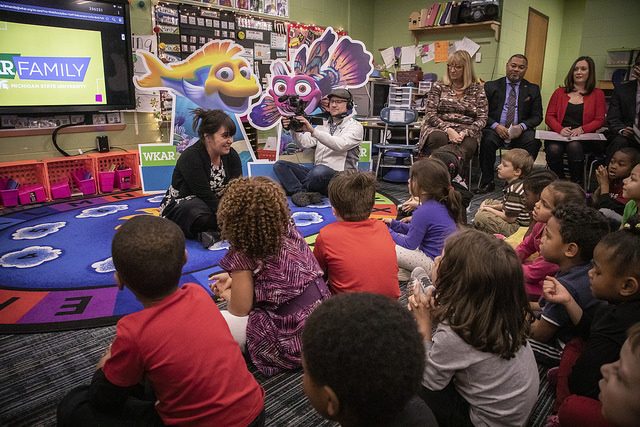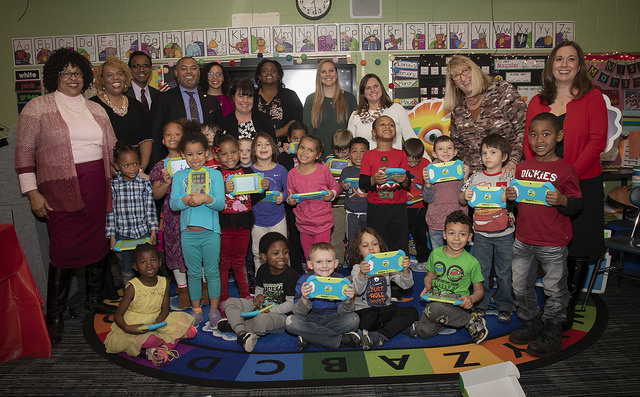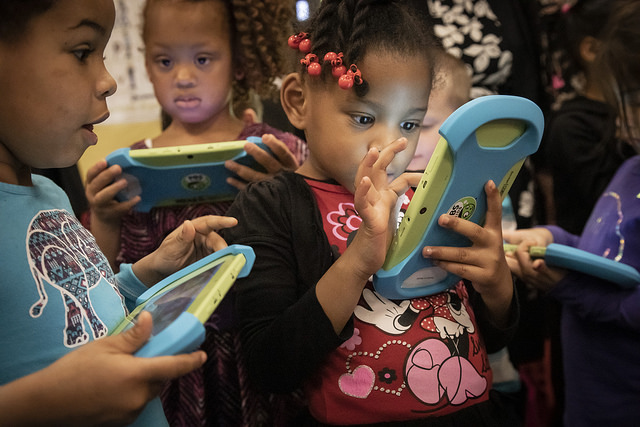Nearly 1,200 interactive learning tablets were distributed to kindergarteners in the Lansing School District in November, as part of the PBS KIDS Playtime Pad Research Project.
In its second year, the Playtime Pad Research Project investigates the effectiveness of tablet-based learning initiatives in early childhood math and reading literacy, while providing access to the latest digital learning tools for students, teachers, and parents. The project is a partnership of Michigan State University, WKAR, PBS and the Lansing School District.
"This is an exciting partnership that brings quality PBS programming to Lansing Kindergartners, through new technology that children love; while strengthening the community connection between MSU, WKAR and the Lansing Schools," said Julie Sochay, WKAR Content and Community Engagement Manager. "We are honored to be working together and look forward to where this project will take us."
New Research on Reading Literacy
On Wednesday, Nov. 14, 2018, representatives from WKAR TV, MSU and the Lansing School District visited Riddle Elementary School to pass out Playtime Pads to kindergarteners. The students gathered in a classroom to learn about the tablets and the interactive apps, then they walked up one by one to receive their own PBS KIDS Playtime Pad.
“Part of our WKAR Family mission is to give more than 1,000 Playtime Pads to kindergartens in the Lansing School District,” said Prabu David, Ph.D., Dean of MSU’s College of Communication Arts and Sciences. “We’re very excited to be here, and to continue this partnership.”
The Playtime Pads come loaded with a Math Games Study app, designed by PBS KIDS software developers in consultation with early childhood education researchers at MSU. New in 2018, the iRead educational app, a tool from Houghton Mifflin Harcourt, was also provided to kindergarteners at Riddle Elementary School and Dwight Rich School of the Arts to improve their skills in reading literacy.

“This year, we’re going to build upon that content and expand with the iRead app, so that Lansing students are ready for the new state requirements that pertain to third grade reading,” said Associate Professor Amy Parks, Ph.D., from MSU’s College of Education. She said the Playtime Pads include apps and features that can be customized to meet individual student needs.
In addition to research being conducted through the Math Games Study app, the iRead app will allow researchers to study literacy markers. The data will be tracked through voluntary participation from students’ parents, and it will be shared with the Lansing School District.
Expanding Access to Technology
“It goes without saying that computer savviness is becoming a necessity,” said Superintendent Yvonne Caamal Canul, HD.L. She said this is an exciting opportunity for the Lansing School District. “I’m even more pleased that we can partner on this research and gain an understanding about how these tablets are being used.”
Lansing School Board Secretary Bryan Beverly, Ph.D., said the project offers real benefits to students, while ensuring every kindergartner has access to the latest educational technology.
“Having the ability to deliver technology, tools and skills is of critical importance for us in today’s world,” said Beverly. From an economic standpoint, he said it’s vital to bridge the digital divide and introduce young learners to technology early in their education, leading them to success later in life.
Insights into Tablet-Based Learning
During the first year of the study, researchers aimed to help students improve their test scores. While the Playtime Pads offered some gains for students in this area, researchers will hone in on more specific targets during the second year, to determine how the interactive technology can deliver more benefits to students in reading and math.
“My piece in this project is researching how parents engage with technology and how educators engage with technology, in order to investigate the way that students use technology,” said Assistant Professor Fashina Aladé, Ph.D., from MSU’s College of Communication Arts and Sciences. “Generally, parents develop positive attitudes which help influence positive outcomes.”

While the research project is still in the early stages, the resulting data will offer insights on how tablet-based learning can be used to improve early childhood education. Parks is leading the initial research phase focusing on math literacy, and Assistant Professor Laura Tortorelli, Ph.D., of the College of Education, is leading research around the iRead app.
The project has been approved by the MSU Institutional Review Board. No data will be collected from tablets of families who opt out of the study, and those kindergartners still receive a Playtime Pad.
For more information, visit: wkar.org/playtime-pad-research-project
By Melissa Priebe
